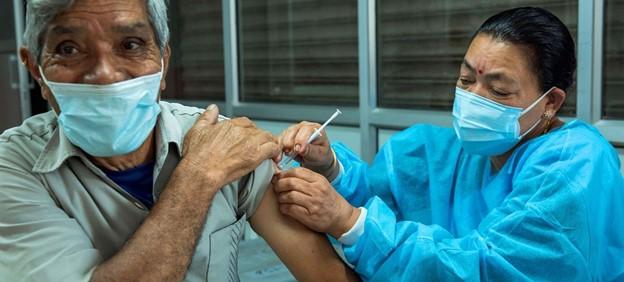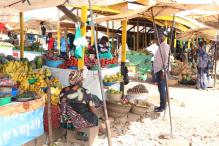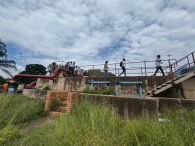As a global pandemic, COVID-19 and its continued impacts are unprecedented. Yet many of the challenges that emerged in public health responses to COVID-19 not only had precedence, but were predictable.
As the international community observes World Immunization Week (April 24-30), it is a critical moment to reflect on what lessons have, and have not, been learned, and how we can accelerate progress towards vaccine equity.
The theme of the 2022 World Immunization Week is “Long Life for All”, a framing which underscores the benefits for every individual of access to and uptake of vaccinations. However, this obscures the significant and persistent barriers that ensure that the reality of vaccination is access and uptake for some, not all.
The development of effective and safe vaccines to protect against severe COVID-19 disease is a huge scientific achievement, which placed a spotlight on vaccine development and deployment and highlighted both successes and challenges. Inequity in vaccine access has been evident between high income versus low and middle-income countries, as well as within regions and nations.
As of 14th April 2022, 65% of the total world population has received at least one dose of a COVID-19 vaccine, yet only 15.2% of people in low-income countries have received at least one dose. Even where vaccines are available, access and uptake is impeded by gender-related barriers and inequities, in communities and in health services and settings.
Data on COVID-19 vaccine disaggregated by sex is limited, with the Sex, Gender and COVID-19 Project reporting in its COVID-19 Sex-disaggregated Data Tracker that only 89 countries have ever reported sex-disaggregated data for vaccinations (at least one dose) and 67 countries for fully vaccinated. Only two countries, India and Austria, report on vaccinations for non-binary people.
Overall, the Data Tracker reports that global data indicates equal numbers of men and women being vaccinated, but that at the country level, there are some significant differences, including Yemen, where 93% of people with one dose are male, and Thailand where 36% are male. In terms of vaccine population coverage, in five countries reporting this data coverage is more than 5% higher in males than females, and in seven countries the reverse is true.
This indicates a critical point in discussions of gender-related barriers – the negative impact of these varies by setting and context, and affect men as well as women and gender diverse people.
As well as vaccination coverage, there are also differences in hesitancy and intention to take up the vaccine when offered or available. A systematic review of gender differences in intention to take up vaccination found that men were “on average 41% more likely to report that they intended to receive a vaccine (rather than being unwilling or undecided) compared with women”.
Gender-related barriers to vaccination exacerbated by COVID-19 have been identified by GAVI as including: limited access to health services, increasing unpaid care responsibilities disproportionately borne by women, increases in gender-based violence, and inequitable access to health information including digital platforms.
Limited ability to travel to attend health facilities, discrimination and harassment in health services, and limited decision-making power, are also significant barriers. Vaccine hesitancy among healthcare workers has also been identified as a challenge, requiring targeted messaging and efforts to work with and learn from their experiences.
Recognising the substantial gender barriers to equitable vaccine access and uptake, the SDG3 Global Action Plan for Healthy Lives and Well-Being for All: Gender Equality Working Group and the Gender and Health Hub, United Nations University International Institute for Global Health have developed a Guidance Note and Checklist for Tackling Gender-Related Barriers to Equitable Covid-19 Vaccine Deployment.
The aim of the checklist is to support efforts to ensure that as many people as possible, regardless of their gender identity and the gender norms that prevail in their communities, have equitable access to COVID-19 vaccines. Drawing on evidence of gender-related barriers and what works to address them, it offers practical actions for countries to implement to ensure that COVID-19 vaccine deployment upholds gender equality and equity, contributing to the aim of ‘long life for all’ through leaving no one behind in vaccine access.
If action is not taken to address gender barriers in COVID-19 vaccine access and uptake, we risk significant gaps in vaccination coverage, undermining the achievement of population-level immunity which is essential in curbing the pandemic.
At the individual level, many more people will become sick and die if we fail to realise the full potential of COVID-19 vaccination programmes by failing to ensure equitable access. In turn, these outcomes will lead to delayed economic recovery, exacerbating existing inequities and further marginalising those already marginalised.
The spotlight shone by the COVID-19 pandemic has also created opportunities to do things differently. Progress has been made in some key areas, which can and should now be implemented and accelerated more widely. The importance of sex and gender disaggregated data at all stages of research and development through to delivery has been more widely recognised and must now be adopted across the board.
While some countries are collecting and reporting such data, significant gaps remain, as well as the opportunity for COVID-19 to be a catalyst to act to fill these gaps. Progress has also been made in developing and delivering interventions that engage women and girls and/or marginalised people as co-designers of solutions, rather than simply recipients of interventions.
The checklist provides practical steps for actors involved in vaccine deployment to integrate attention to sex and gender in their core business and approach, to mitigate barriers at each step in COVID-19 National Deployment and Vaccination Plans (NDVPs), ensuring that gender-related barriers are prioritised not an afterthought.
The costs of failure are immeasurably high, yet the gender-related barriers that have emerged in COVID-19 vaccine deployment were anticipated and can be mitigated. The checklist outlines clear, actionable steps to effectively tackle gender-related barriers at each step of vaccine deployment, from making sex and age disaggregated data on pre- and post-market vaccine trials an essential requirement for expedited approval and emergency regulatory approval procedures, to using differentiated vaccine delivery strategies to effectively reach women, men and gender-diverse people.
By implementing the actions in this checklist, identifying and acting on known and context-specific gender-related barriers, prioritizing targeted outreach to vulnerable and disadvantaged groups and partnering with women’s organizations and other community-based groups, it is possible to address and mitigate these barriers.
It further supports integration of gender as part of the core business of governments and partnerships engaged in COVID-19 vaccine deployment and delivery, rather than an add-on or afterthought, which is often the case yet seriously undermines potential impact.
The gender-related barriers to equitable vaccine deployment are persistent but not immutable, predictable but not inevitable. We have the vaccines, we have the knowledge to deploy them equitably, what is needed now is the will to get it right.
Dr Jacqui Stevenson is a Research Consultant at the United Nations University International Institute for Global Health (UNU-IIGH). Dr Sagri Singh is the Chief of Gender and Health at UNU-IIGH. They lead the work to generate new evidence on the intersections of gender and health, including COVID-19.
This article is originally published at IPS News.




